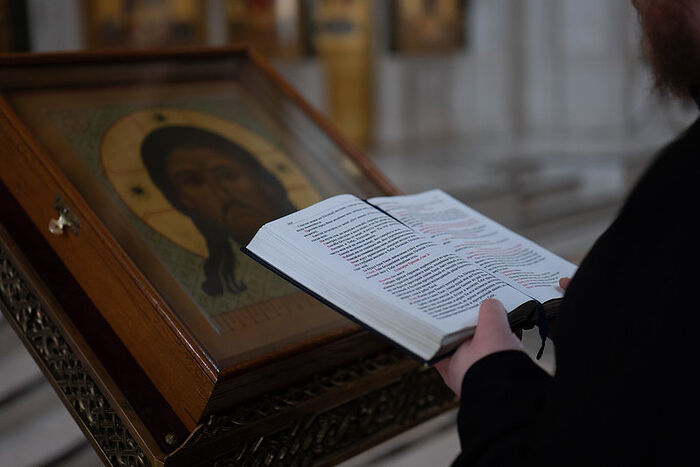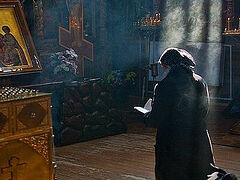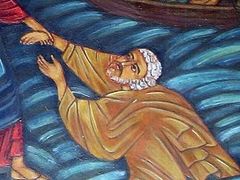All Orthodox Christians are now in a special expectation—Great Lent is coming. It will commence on February 27, and our preparation for it is no less important than the forty days of fasting themselves. We asked some priests to tell us how to prepare the body and the soul, what goals to set for Great Lent, what prayer rule to perform, and what role the father-confessor plays in this process.
Abbot Luke (Stepanov), father-superior of the Holy Transfiguration Monastery in Pronsk, Bryansk region:
If you want to walk through Great Lent together with the Church (especially if you have no experience of fasting), it would be advisable to turn to the priest to determine the measure of your bodily restrictions, prayer labors and participation in church services. The aim of Great Lent (on the threshold of the spiritual culmination of the year—Passion Week and Bright Week) is to renew your outer and inner lives in accordance with the requirements of the Spirit for full participation in the Church events of Christ’s Crucifixion and Resurrection in order to be crucified and (in the future) resurrected together with Him.
Such motives as “to lose weight”, or “because I am sick and tired of everything”, or “my skin will become smooth and elastic” are not appropiate here. Fasting is meaningful and fruitful if there is time for earnest prayer and frequent attendance at services not only on Sundays, but also on weekdays. From Monday to Friday there are numerous kneeling prayers in churches with the Prayer of St. Ephraim the Syrian, “O Lord and Master of my life…” (which the greatest Russian poet Alexander Pushkin loved), and the touching Liturgy of the Presanctified Gifts, and penetrating penitential stichera and canons. All of them can influence a penitent contemporary significantly, imprinting in his soul a steadily grace-filled disposition; and this is the objective of any pious undertaking!
Priest Anthony Borisov, Associate Professor of the Department of Church History of the Moscow Theological Academy:
As in the days of the early Church, today there are people who believe that the spiritual life is expressed solely in the performance of some specific rites and the scrupulous observance of these customs supposedly gives you indulgence to various sins. Relatively speaking, I will steal something at work, then go and put a candle in the church, go to confession, and continue to sin with a clear conscience.
The Holy Scriptures and the entire spiritual tradition of our Church openly condemn any hypocritical attitude towards faith, and say that in order to lead a genuinely spiritual life you must first learn to fulfill the mundane commandments of Moses. Basing on them as on a reliable foundation, you can begin to construct a building of a more perfect spiritual life, for example, start fasting consciously.
The Apostle Paul in his epistles repeated that abstaining from food in general or from certain types of foods is not a religious act in itself—it’s just a diet. How can we turn abstaining from food into a form of worship? By putting love for God and people at the foundation of this behavior. In practice, this means the following:
Fasting becomes a bridge between a person and God only when it is combined with prayer and the desire not only to correct some theoretical imperfections, but to root out concrete vices and shortcomings. But that’s not all. Fasting should be manifested in relation to people around you. During the fasting season, the Church calls on us to learn mercy, to shift the focus of attention from our own needs to our neighbor’s. For example, the funds saved during the fasting period can be donated to those in need. And if you cannot help others financially, then sincerely sacrifice your time and attention to them.
Priest Nikolai Savchenko, cleric of the Church of St. Peter, Metropolitan of Moscow, on Romenskaya Street in St. Petersburg:
While preparing for Great Lent, do not overeat and do not try to have time to do something that will then be impossible to do. It is better to gradually and smoothly prepare for the fact that soon we will limit ourselves even more. The life of a Christian is limitations for the good, so that our souls can be pure, kind and loving.
It is advisable to give up your weaknesses and indulgences during fasting. It will be another step towards God. It is better to do something every day, even something small, than one big thing which we will forget about later. There should be constancy in little things.
During fasting it is also necessary to perform the morning and evening prayer rules as fully as possible. To many it will seem long and difficult, but you can do it on the way to work—you will soon learn the text by heart this way. Instead of silly songs, prayers will sound in your mind. Every day you should also read the Gospel and the Epistles a little at a time. It can be done instead of watching TV and online videos or doing futile things.
Hieromonk Theodorit (Senchukov):
Great Lent is a period when we must focus on prayer and repentance. The fact is that we need to meet the Lord in our wedding garments. And our “wedding garments” are those of our souls, cleansed from sins. It is precisely for thorough repentance that fasting is needed. And the ascetic practices—all the food restrictions—are needed so that we may think less about the belly and more about the spirit.
The body will spend less energy digesting Lenten food—this is physiology. It means that this energy can (and should) be spent on prayer and spiritual growth.
Of course, fasting should not turn into self-flagellation or pride, when a person thinks that he is a great faster. Everything should be according to your capabilities. There is the Typikon, where the rules of fasting are given in detail. But you must always remember that the Typikon is a model, an ideal. We differ from monks of the Lavra of St. Sabbas the Sanctified of the early Christian era in terms of lifestyle, climatic conditions, and chronic diseases. That is why you need to organize your fasting in accordance with your capabilities and, first and foremost, your state of health. It is certainly better to consult with your father-confessor, let him know about medical recommendations and heed his advice.
If you have no father-confessor, you need to set for yourself the maximum feasible level, but do not deviate from it. And if you decide to eat only boiled food without oil for the whole week, then allow yourself no oil and wine and certainly no fish outside specially ordained days. And if for medical reasons you need to use oil, then it must be just oil without seafood added to it.
If you need to have cottage cheese or yogurt because of your bad stomach, receive a blessing and do it. But do not use this blessing to eat tiramisu—permission to have yogurt and cottage cheese is not an indulgence, but a blessing for treatment!
Many people intensify their prayer rule during Great Lent. This is good, but it is advisable to take on reading so many such-and-such prayers, canons or akathists with the blessing of your father-confessor, and not by your personal whim. It is better to read what your soul has an urge for at the moment.
And, of course, try to go to church more often, go to confession and receive Communion. Then we will reach Pascha with pure souls, and meet the risen Lord Jesus Christ with joy.








